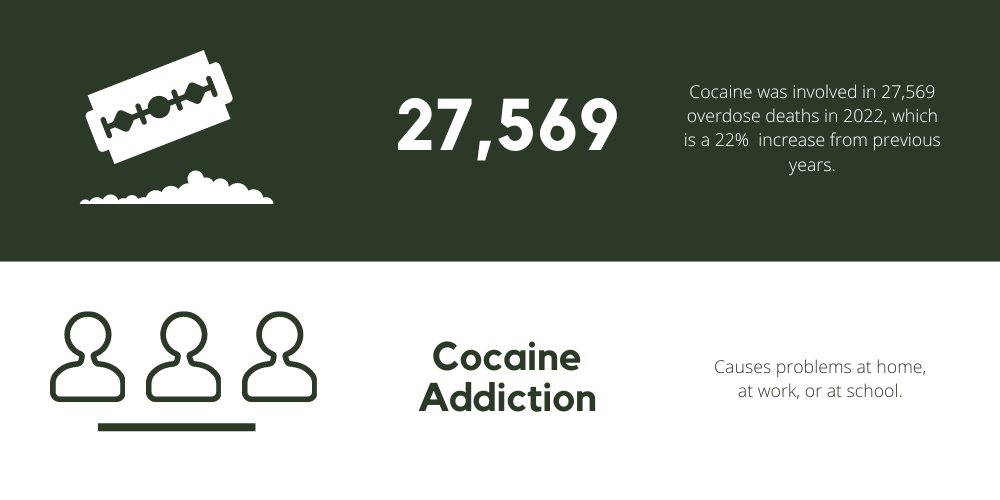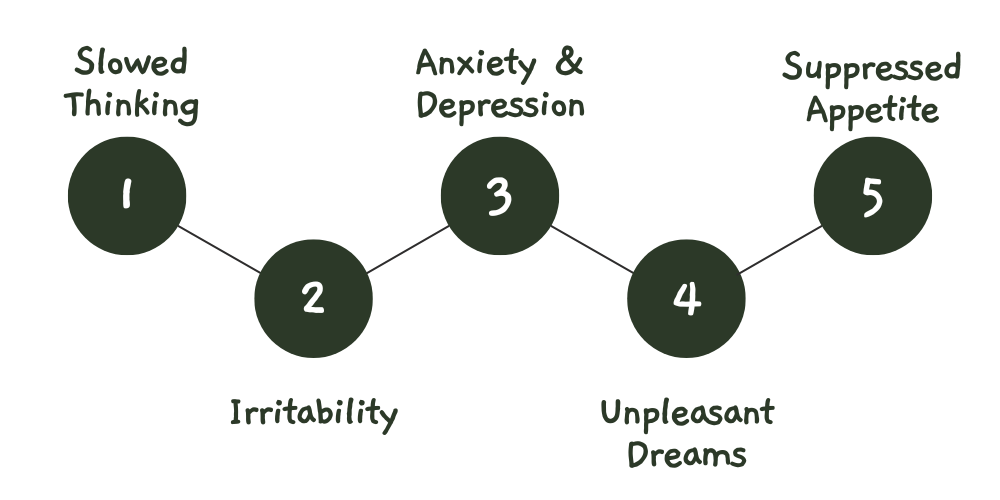What We Treat

Cocaine Detox Southern California
Cocaine is a fast-acting stimulant that hijacks the brain’s reward system. It causes sharp spikes in dopamine levels, triggering temporary euphoria, confidence, and alertness. But with repeated use, the central nervous system becomes overstimulated, leading to physical dependence, insomnia, irritability, and long-term cognitive impairment.
In Southern California, cocaine addiction impacts people across all age groups and backgrounds. The combination of cocaine with other drugs like methamphetamine, fentanyl, and alcohol intensifies risk and worsens withdrawal. Stimulant use is rising in San Diego, Orange County, and Mission Viejo, with many individuals also struggling with mental health disorders and prescription drug addiction.
According to the California Overdose Surveillance Dashboard, cocaine-related overdose deaths increased significantly in recent years. Many involve a dual diagnosis, where cocaine use coexists with conditions like anxiety or bipolar disorder. These patterns reflect a broader public health challenge, highlighting the urgent need for early intervention, drug detoxification, and access to professional treatment centers.
Cocaine withdrawal affects both the mind and body. People who attempt to quit cold turkey often face intense cravings, sleep disruption, depression, and paranoia due to the brain’s reduced dopamine activity. These changes in the central nervous system can result in impaired cognition, high stress, and poor emotion regulation, increasing the risk of relapse.
Structured detox at Sullivan Recovery includes medical detox support, expert oversight, and therapies designed to ease symptoms and build healthy coping skills. Our program helps restore the brain’s natural reward system and improves mood, attention, and motivation—critical elements for achieving lasting sobriety.

Cocaine detox focuses on safely removing the stimulant from the patient’s system while managing the physical and psychological effects of withdrawal. The absence of dopamine triggers severe emotional and behavioral shifts such as fatigue, insomnia, and cognitive impairment. These symptoms are amplified when the individual has used other substances like benzodiazepine or opioid drugs.
Our treatment center provides a comprehensive detox program that uses medication to reduce anxiety and cravings, alongside therapies such as yoga, music therapy, and meditation to stabilize the mind. Dialectical behavior therapy and contingency management improve behavioral control and stress resilience. Nutrition support also plays a role in balancing the circulatory system and promoting physical health.
Sullivan Recovery’s outpatient cocaine rehab provides an effective alternative to inpatient or PHP care. It enables patients to receive therapy, medical guidance, and relapse prevention support while continuing work, school, or family responsibilities. This level of accessibility is vital for many individuals seeking help without pausing their lives.
Our rehab team uses evidence-based strategies rooted in psychology, behavior change, and emotional regulation. Patients learn to cope with stress, boost self-confidence, and rebuild their lives through therapy, including CBT, DBT, and holistic approaches. By treating both substance abuse and co-occurring disorders like depression or anxiety, we strengthen every patient’s path to long-term sobriety and mental clarity.
Many patients struggling with cocaine addiction also experience dual diagnosis disorders. These may include bipolar disorder, depression, trauma, or anxiety. Mental health issues can fuel drug use and vice versa. That’s why treating both the disease of addiction and underlying mental health conditions is key.
Our clinicians are trained in psychology, behavior analysis, and integrated care approaches. We assess each patient’s cognition, mood, attention, and stress tolerance to build a holistic treatment plan. This dual focus reduces relapse risk and enhances outcomes.
Cocaine disrupts multiple brain systems. It floods dopamine pathways, causing short-term pleasure but long-term cognitive dysfunction. Over time, cocaine impairs memory, attention, and motivation while increasing paranoia and aggression. The drug also strains the circulatory system and central nervous system, raising the risk of heart attack, stroke, and sudden death.
Many users report fatigue, sleep problems, and emotional instability as side effects of cocaine withdrawal. A medically monitored detox and rehab plan helps manage these symptoms and prevent relapse.

Cocaine is often used alongside alcohol, opioid, benzodiazepine, or methamphetamine drugs. These combinations increase health risks and make detox more complicated. For example, combining a stimulant like cocaine with a depressant like alcohol or benzodiazepine can cause dangerous fluctuations in heart rate and mood.
At Sullivan Recovery, our detox program screens for multiple substances, including opiate, fentanyl, and prescription drug addiction. We ensure the safest detoxification process through medication, clinical supervision, and evidence-based therapy.
The most common withdrawal symptoms include fatigue, sleep disruption, mood swings, cravings, and cognitive impairment. These symptoms vary based on the dose, frequency of use, and presence of co-occurring disorders such as anxiety, bipolar disorder, or prescription drug addiction. Cocaine withdrawal also affects the nervous system and disrupts dopamine production, which can impair attention, emotion regulation, and overall mental health.
Our team uses a mix of therapies and holistic tools to ease withdrawal and promote mental clarity:
These therapies work in sync to reduce relapse risk and strengthen the patient’s ability to cope with drug cravings, psychological discomfort, and physical dependence. For individuals with dual diagnosis or long-term stimulant use, therapy may also address lingering effects from methamphetamine or alcohol abuse, which often overlap with cocaine use.
At Sullivan Recovery, we enable every patient to feel supported through expert care, compassion, and consistent structure. Whether they are detoxing from cocaine, opioid, benzodiazepine, or another substance, our patients receive guidance rooted in psychology, behavior stabilization, and emotional support.
Our outpatient rehab model blends accountability with freedom, helping individuals stay engaged in treatment without pausing their entire lives. This model empowers each patient to take ownership of their sobriety, practice real-world coping strategies, and access PHP or extended therapy if needed through our network.
We understand the emotional toll addiction takes on the mind and relationships. That’s why we create an environment where motivation, emotion, and understanding are prioritized in every phase of recovery. Our clinicians support recovery from both substance abuse and the underlying mental health conditions that often fuel it—building a foundation for long-term health and sustained sobriety in Southern California.
Choosing outpatient detox in Southern California provides more than convenience. It gives patients time to practice coping skills in the real world, adjust medication with clinical support, and attend therapy while staying connected to work, school, or family.
Outpatient programs also reduce costs and improve accessibility. Sullivan Recovery accepts most major health insurance plans to keep care affordable. We believe that every individual should have access to drug detoxification and rehab services without barriers.
Therapies play a critical role in rewiring the brain after cocaine use. Key approaches include:
These therapies support long-term recovery and help patients avoid internet drug communities and environments that enable use.
Relapse is a major concern during and after cocaine detox. Cravings may appear suddenly, triggered by stress, attention dysregulation, or memories of drug use. Patients often experience psychological symptoms like fatigue, low emotion, and poor motivation even after detox.
Our relapse prevention plan includes:
Cocaine use increases the risk of:
If you or a loved one is struggling with cocaine or any other drug, early intervention can save a life. Detox is the first step, but rehab, therapy, and continued support are essential for long-term success.
Sullivan Recovery serves patients across Southern California, including Mission Viejo, San Diego, and the greater Orange County area. Our outpatient model allows people to detox safely, receive quality therapy, and return home the same day.
We work with most health insurance providers and offer flexible schedules to meet patient needs. Whether you’re seeking help for yourself or a loved one, our team is here to provide expert guidance and accessible treatment.
Cocaine addiction is a disease that affects the brain, body, and behavior. It disrupts dopamine function, impairs mental health, and alters mood, attention, and motivation. But with the right detox program and rehab support, recovery is possible.
At Sullivan Recovery, we combine evidence-based treatment, dual diagnosis care, and compassionate support to help you reclaim your life. Whether you’re in San Diego, Mission Viejo, or anywhere in Southern California, our outpatient program offers expert help without delay.
Take the first step today. Call our treatment center to begin your journey toward sobriety, healing, and long-term health.
Cocaine detox usually takes between 5 to 10 days, though psychological symptoms like cravings, anxiety, and fatigue may last longer. The exact timeline depends on the frequency of use, dosage, and individual health. Ongoing outpatient therapy helps manage lingering symptoms and reduces relapse risk.
Yes, outpatient cocaine detox can be safe for long-term users when managed by experienced medical professionals. At Sullivan Recovery, we assess each patient’s physical and mental health to ensure detox is clinically appropriate. For patients with severe symptoms or polysubstance use, we may recommend a higher level of care before transitioning to outpatient rehab.
Most health insurance plans do cover cocaine detox and outpatient treatment services. Sullivan Recovery works with many major providers in Southern California to ensure treatment remains affordable and accessible. We also help patients verify their insurance benefits quickly and privately.
Yes, outpatient detox is designed to fit around your schedule. Patients typically attend therapy sessions and medical check-ins during set hours while continuing work, school, or caregiving responsibilities. Sullivan Recovery offers flexible scheduling options to support both treatment and daily life.
We are available around the clock to assist you, every day of the year.
© 2024 Sullivan Recovery. All rights reserved.